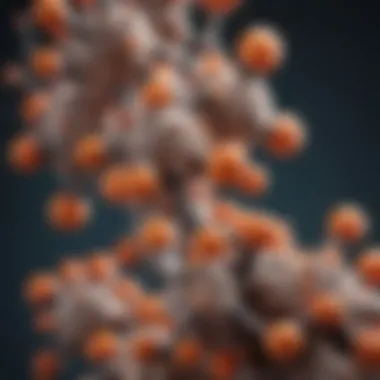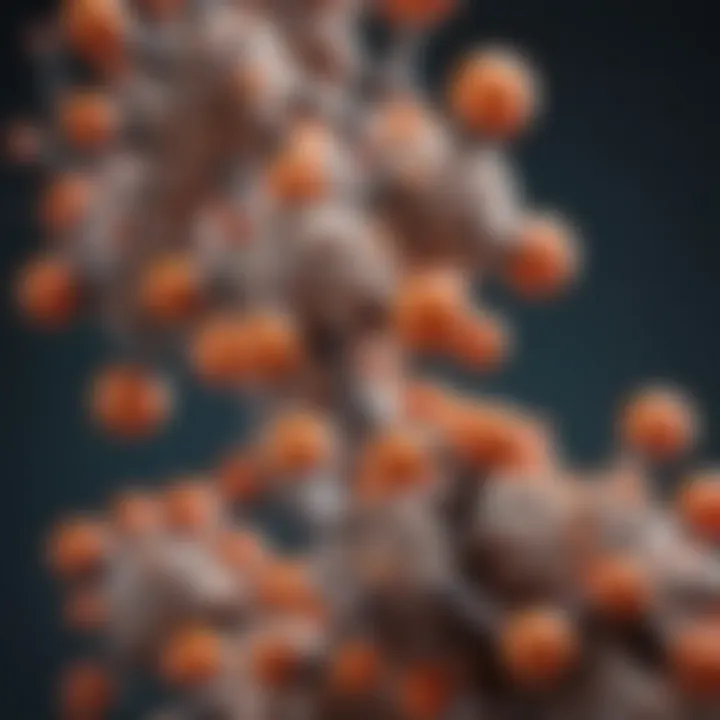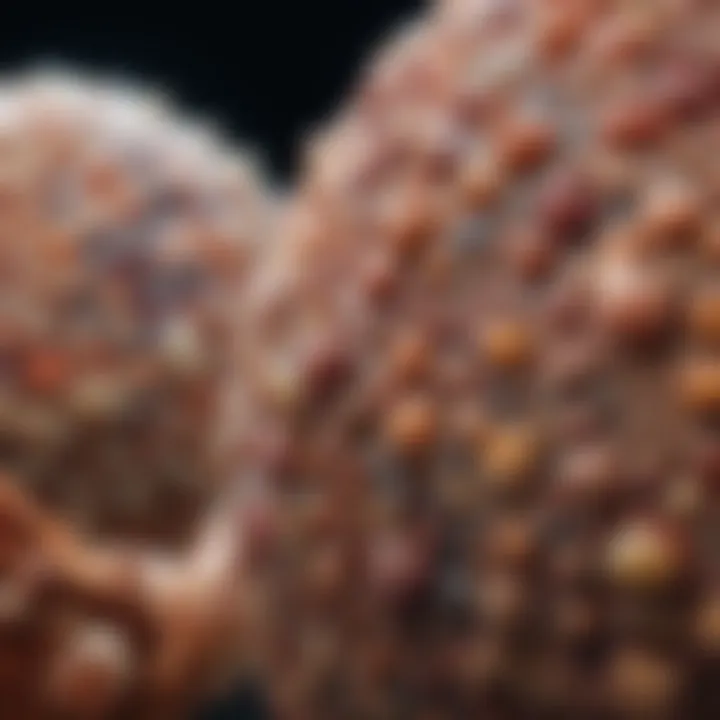Exploring Urolithin Benefits and Their Impact on Health


Intro
The exploration of urolithins can illuminate a unique pathway to understanding health benefits derived from dietary sources. Urolithins are metabolites generated from polyphenolic compounds, predominantly found in pomegranates and berries. This article examines how these compounds interact with the body, emphasizing their potential in cellular aging, inflammation, and age-related diseases. Moreover, it seeks to provide an in-depth analysis of current research, methodologies, and future directions regarding urolithins. For individuals interested in integrating nutrition with health, comprehending urolithins offers actionable insights.
Methodology
Study Design
The study design behind urolithin research varies but typically combines clinical trials, observational studies, and laboratory experiments. Rigorous protocols are applied to assess the efficacy and mechanisms of action of urolithins in various contexts. These designs often include control groups to measure changes accurately.
Data Collection Techniques
Data collection methods in urolithin studies primarily involve:
- Biochemical Analysis: Blood and urine samples are analyzed to quantify the levels of urolithins.
- Dietary Assessments: Participants may undergo dietary recall interviews to determine intake of polyphenolic-rich foods.
- Health Surveys: Health indicators are recorded through questionnaires assessing inflammatory markers and cellular health.
The accumulation of this data allows researchers to draw connections between urolithin consumption and health outcomes, providing substantial findings for further application.
Discussion
Interpretation of Results
Recent studies indicate that urolithins may possess anti-inflammatory properties, which can contribute to better health outcomes. These metabolites have shown promise in reducing oxidative stress, which is significant in combatting age-related decline. Moreover, urolithins play a role in mitophagy, the process of degrading damaged mitochondria, suggesting their influence on longevity and overall cellular health.
"Research suggests that urolithins can enhance mitochondrial function, potentially leading to improvements in physical endurance and metabolic health."
Limitations of the Study
It is essential to acknowledge limitations within the existing body of research. Variability in individual metabolic responses to urolithins complicates the understanding of their benefits. Additionally, many studies rely on animal models or small human sample sizes, limiting the generalizability of results.
Future Research Directions
Future research on urolithins should aim to address these limitations through larger, well-structured clinical trials. There is also a need for longitudinal studies to better understand the long-term effects of urolithin consumption. Exploring the interaction of urolithins with other dietary components could uncover synergistic effects that enhance health benefits.
By continuing to dissect the implications of urolithins, the foundation for practical dietary recommendations could strengthen, ultimately enriching our understanding of nutrition’s role in health.
Prelude to Urolithins
Urolithins have garnered attention in recent years due to their potential health benefits, particularly in relation to aging and inflammation. This section aims to establish a foundational understanding of urolithins, exploring their definition, origin, and classification. By gaining insights into urolithins, readers can appreciate their significance in the context of health and wellness.
Definition and Classification
Urolithins are bioactive compounds that emerge from the gut microbiota's conversion of polyphenolic substances, primarily found in pomegranates and certain berries. They are classified into various forms, depending on the metabolic processes involved. The main types include urolithin A, urolithin B, and their derivatives. Each of these forms exhibits distinct biochemical properties and health effects, giving rise to specific research interests.
- Urolithin A: Notably studied for its potential to promote mitophagy, the process of clearing damaged mitochondria from cells. Its effects suggest a possibility for enhancing cellular function and longevity.
- Urolithin B: Less studied than its A counterpart, but still relevant for its unique properties and potential health benefits.
Understanding these classifications helps researchers pinpoint how each type interacts within the body and supports various health functions.
Origin of Urolithins
Urolithins originate from the degradation of ellagitannins, a class of polyphenols present in fruits, especially pomegranates, and berries like raspberries and strawberries. After ingestion, ellagitannins undergo complex metabolic transformations facilitated by the gut microflora. This process results in the formation of urolithins, which are then absorbed into the bloodstream and distributed across the body. Factors such as the composition of an individual's gut microbiota can greatly influence the efficiency of this conversion.
The formation of urolithins underscores the intricate relationship between human diet, gut health, and overall wellbeing.


In summary, the exploration of urolithins provides insights into their significance from dietary sources to health implications. As the understanding of urolithins expands, their potential roles in promoting health and preventing age-related diseases become more evident.
Biochemical Pathways
Understanding biochemical pathways is essential in the context of urolithins because they reveal how these metabolites influence various physiological processes. Urolithins are not just simple compounds; they are products of complex metabolic transformations that occur once polyphenols enter the body. By dissecting these pathways, we uncover their role in health and disease, underscoring the necessity of further research in this area. The emphasis on cellular interactions, molecular mechanisms, and physiological outcomes cannot be overstated, as these insights are fundamental to applying urolithins in preventive health strategies and therapeutic interventions.
Metabolism of Polyphenols
Polyphenols, primarily found in fruits like pomegranates and berries, undergo intricate metabolic processes once ingested. These compounds are characterized by their rich antioxidant properties and are believed to contribute significantly to health outcomes. The metabolism begins in the gastrointestinal tract, where polyphenols get broken down by gut microbiota into smaller phenolic acids. This transformation is crucial because it enhances the bioavailability of these compounds.
The following steps are involved in the metabolism of polyphenols:
- Hydrolysis: Polyphenols are hydrolyzed by digestive enzymes, releasing simpler sugars and phenols.
- Microbial Fermentation: The gut microbiome ferments existing polyphenols to create diverse metabolites, including urolithins.
- Absorption: These smaller compounds are then absorbed into the bloodstream, enabling them to exert their effects at the cellular level.
The metabolic pathway of polyphenols ultimately sets the stage for the formation of urolithins, indicating a pivotal relationship between dietary intake and their health-promoting capabilities.
Conversion to Urolithins
Following the metabolism of polyphenols, the conversion to urolithins occurs mainly through the action of specific gut bacteria. Not all individuals will produce the same amounts or types of urolithins, as this depends heavily on the microbiota composition. Generally, this conversion can be understood through several key processes:
- Microbial Degradation: The gut microbiota degrades polyphenols into urolithin precursors.
- Transformation: These precursors undergo further modifications by a series of enzyme-catalyzed reactions, transforming them into distinct forms of urolithins, such as urolithin A and B.
- Systemic Distribution: These urolithins then enter systemic circulation and can exert health effects on various tissues.
This conversion is critical because urolithins are the active forms that deliver beneficial effects, such as enhancing mitochondrial function and offering anti-inflammatory properties.
This conversion process highlights the significant interplay between diet, gut health, and the metabolic fate of polyphenols, which ultimately impacts human health.
Health Benefits of Urolithins
The health benefits of urolithins are becoming increasingly important in the context of nutritional science and preventive medicine. Urolithins, particularly urolithin A, exhibit several properties that can contribute to improved health outcomes. Their unique relationship with aging, anti-inflammatory effects, cardiovascular health, and metabolic advantages are noteworthy. Understanding these aspects helps clarify why urolithins merit attention.
Impact on Aging
Effects on Cellular Senescence
Cellular senescence is a process where cells lose the ability to divide and function properly. Urolithin A has a role in promoting the elimination of senescent cells. This contributes to tissue health and rejuvenation. The key characteristic of the action of urolithin A in this context is its effectiveness in enhancing mitochondrial function. Mitochondria are critical for energy production in cells. By reducing senescent cells, urolithins may help delay age-related decline in cellular function. This becomes a beneficial aspect, supporting longevity and vitality. However, more research is needed to fully understand the extent of these effects, particularly in human subjects.
Role in Mitophagy
Mitophagy refers to the selective autophagy of deteriorating mitochondria. Urolithins may enhance this process, leading to improved cellular energy metabolism and reduced oxidative stress. The unique feature of urolithins in promoting mitophagy is significant as it helps maintain healthy cellular function. Increased mitophagy supports better performance of cells, especially in aging individuals. It reduces the burden of damaged mitochondria, which could otherwise lead to disease. Therefore, understanding this role is essential in discussing urolithin benefits for health.
Anti-Inflammatory Properties
Mechanisms of Action
Urolithins possess anti-inflammatory properties that can help mitigate chronic inflammation. These metabolites interact with various signaling pathways that control inflammatory responses. A central aspect of their mechanism of action involves modulation of nuclear factor kappa-light-chain-enhancer of activated B cells (NF-κB). This is a primary regulator of inflammation. Their role here is notable as it demonstrates potential for managing conditions related to inflammation. However, determining optimal dosages and long-term influence requires further investigation.
Clinical Implications
The clinical implications of urolithins lie in their potential to serve as complementary therapies for inflammatory conditions. Current studies suggest that integrating urolithins into a dietary regimen could help improve inflammatory profiles. This characteristic makes them appealing for consideration in preventive health strategies. Observations from various trials indicate promising outcomes, but consistent evidence across diverse populations needs to be established to verify these claims fully.
Cardiovascular Health
Effects on Lipid Profiles
Urolithins may influence lipid profiles by potentially lowering levels of low-density lipoprotein (LDL) cholesterol and increasing high-density lipoprotein (HDL) cholesterol. The primary benefit here is improved cardiovascular health, as favorable lipid profiles correlate with lower cardiovascular risk. This aspect enhances the attractiveness of urolithins in dietary recommendations. Nonetheless, clear guidelines on their consumption relative to other heart-healthy behaviors are necessary.


Potential in Reducing Hypertension
Emerging evidence suggests that urolithins may help lower blood pressure. The mechanisms might involve endothelial function improvement and vasodilation. This connection makes urolithins a valuable topic in discussions surrounding cardiovascular strategies. While the initial findings are promising, more rigorous clinical trials are essential to confirm these results and determine effective applications.
Metabolic Health
Influences on Insulin Sensitivity
Urolithins might play a role in enhancing insulin sensitivity. They could contribute to better glucose regulation and metabolic function, particularly in individuals at risk of type 2 diabetes. This characteristic positions urolithins as a considerable asset in managing metabolic disorders. However, longitudinal studies are necessary to establish their long-term effects and optimal use.
Interplay with Gut Microbiota
The relationship between Urolithins and gut microbiota offers interesting possibilities. Urolithins are influenced by the gut microbiome; certain gut bacteria facilitate their production. This interplay may lead to improved gut health and metabolic outcomes. Understanding this aspect adds depth to the discussion surrounding urolithins, emphasizing the importance of gut health in overall well-being. However, future research should examine how variations in individual microbiomes might affect urolithin efficacy.
Research Studies and Findings
Research examining urolithins covers a variety of aspects, revealing their potential biological significance and health benefits. Understanding these findings builds a foundation for appreciating how urolithins might influence human health. Animal studies and human trials form the core of this research, each contributing unique insights into the effectiveness and safety of urolithins.
Animal Studies
Animal studies provide critical early-stage evidence for the effects urolithins may have on health. These investigations typically explore the impact of urolithins on various biological systems. For example, studies conducted on rodents have demonstrated that urolithins can possess antioxidative properties, helping to mitigate oxidative stress. This is especially important as oxidative stress is linked to several age-related diseases.
Additionally, some studies indicate that urolithins may enhance physical endurance levels in animals. This effect can be attributed to improved muscle function and increased mitochondrial activity. These findings serve as a strong premise for further research on the performance-boosting effects of urolithins in humans.
The dosage and timing of urolithin administration are factors that researchers have examined. In several cases, the observed health benefits correlated directly with the quantity of urolithins consumed, emphasizing the necessity for further quantifiable studies in future research.
Human Trials
Human trials are pivotal in establishing the relevance of urolithin research to the general public. These trials assess the bioavailability and physiological effects of urolithins in real-world settings. In recent years, several clinical studies have reported positive outcomes regarding metabolic health, inflammation, and aging.
One prominent human trial investigated the effects of urolithins on older adults, particularly focusing on muscle performance and recovery. The results demonstrated enhancements in muscle strength and function, which could have significant implications for maintaining quality of life in aging populations.
Another critical aspect observed in human trials is the role of urolithins in reducing inflammation markers. This finding is particularly relevant for conditions associated with chronic inflammation, providing a potential therapeutic avenue for managing diseases like arthritis or cardiovascular conditions.
Through these studies, researchers have laid a crucial groundwork that can guide future investigations and dietary recommendations surrounding urolithins.
Dietary Sources of Urolithins
Dietary sources of urolithins are crucial in understanding their potential health benefits. Urolithins, primarily derived from specific foods, hold a significant place in discussions about nutrition and health optimization. When we consider how to incorporate these metabolites into our lifestyles, it is important to identify and focus on the foods that enhance their production in the body. A dietary approach to increasing levels of urolithins can greatly impact overall health and contribute to disease prevention.
Primary Sources
Pomegranates
Pomegranates are among the richest sources of urolithins. This fruit is unique due to its high content of polyphenols, particularly ellagitannins, which are the precursors to urolithin formation. The key characteristic of pomegranates is their potent antioxidant properties, which can help combat oxidative stress and inflammation in the body. The process of consuming pomegranates, whether in juice form or as whole seeds, maximizes the potential benefits of these compounds.
The advantage of incorporating pomegranates in one's diet is their accessibility and versatility. They can be added to salads, smoothies, or consumed directly. However, one must consider that the effectiveness of urolithin production can vary among individuals due to gut microbiota differences. This variability means that some people may derive more benefit from pomegranates than others, raising considerations about personalized nutrition strategies.
Berries
Berries, including strawberries, raspberries, and blackberries, are another excellent source of urolithins. These fruits are rich in a variety of polyphenolic compounds that support healthy metabolic processes. The key characteristic that sets berries apart is their low glycemic load, making them a beneficial choice for those concerned with blood sugar levels and weight management. Berries also offer anti-inflammatory benefits and are known for their high vitamin content.
The unique benefit of berries lies in their easy incorporation into daily diets. They can be easily mixed into yogurts, blended into smoothies, or consumed as snacks. However, like pomegranates, the impact of berries on urolithin levels may be influenced by individual digestive health. This aspect highlights the importance of considering gut health when enhancing urolithin intake through diet.
Supplementation Options


Beyond natural dietary sources, supplementation represents another avenue for increasing urolithin levels. Various urolithin supplements are available on the market, often derived from pomegranate extract or formulated with a blend of berry extracts. These supplements may provide a standardized dose of urolithins, which can be advantageous for those looking to achieve specific health outcomes.
While supplements can be beneficial, it is essential to evaluate their quality and bioavailability. Not all supplements are equal. Therefore, choosing reputable brands that offer transparency regarding ingredient sourcing and manufacturing processes is crucial. Additionally, discussing supplementation with a healthcare professional can aid in understanding individual needs and ensuring safety.
Potential Side Effects and Considerations
Considering potential side effects and their implications is crucial when discussing urolithins. While they offer various health benefits, understanding adverse effects and interactions is essential for informed consumption. It helps ensure that individuals make safe and beneficial choices regarding their health.
Safety Profile
Currently, research into the safety profile of urolithins is ongoing, yet early findings suggest that urolithins are generally considered safe for most individuals, especially in moderation. Urolithins are metabolites formed through the gut microbiome's transformation of polyphenols, primarily from sources such as pomegranates and berries. Some studies have shown they exhibit minimal toxicity. However, their effects can vary based on individual health status, metabolism, and even biome variations.
- Common Observations: In most cases, urolithins are well-tolerated and do not cause severe side effects. Mild gastrointestinal issues may occur, such as bloating or discomfort, particularly in sensitive individuals.
- Long-Term Consumption: While short-term studies indicate safety, long-term effects are less understood and would require further research.
Drug Interactions
Understanding how urolithins interact with medications is vital for those undergoing treatment for various conditions. While evidence is still emerging, current insights warrant caution. Urolithins may influence metabolic pathways that certain drugs utilize, potentially altering their efficacy.
- Examples of Concern: Certain anticoagulants, antihypertensives, and diabetic medications could theoretically be impacted due to changes in metabolic processes caused by urolithins.
- Caution is Key: Patients taking medications should consult healthcare providers prior to introducing urolithins into their diets or as supplements. Collaboration between patients and healthcare providers can promote safe consumption strategies while minimizing risks.
"Evaluating the safety and interaction profile of urolithins is essential for preventing unexpected complications."
Future Directions in Urolithin Research
Research on urolithins is at a pivotal juncture. As scientists unravel the complex mechanisms through which these metabolites operate, new avenues for exploration are emerging. The importance of this area lies in its potential to unlock further health benefits and refine clinical applications. The ongoing studies aim to delineate the pharmacological properties of urolithins and their impacts on various biological processes.
Investigating New Urolithins
The landscape of urolithins is not limited to the well-studied types derived from common dietary sources. New derivatives are being identified, presenting a challenge and an opportunity for researchers. By exploring these new urolithins, scientists may discover variants with enhanced bioactivity or specific therapeutic applications.
Studies focusing on less common sources of polyphenols, such as nuts, seeds, and certain grains, are crucial. It is essential to examine how the metabolic pathways differ for these new urolithins compared to those from pomegranates and berries. Expanding the sources and understanding their unique properties can provide insights into how to maximize their health benefits.
Longitudinal Studies
Longitudinal studies are critical for understanding the long-term impacts of urolithin consumption on health. Current research predominantly focuses on short-term effects, limiting our understanding of these metabolites’ cumulative impact over time. By observing cohorts over extended periods, researchers can assess how urolithin intake influences aging, inflammation, and chronic disease progression in different populations.
Data collected from such studies can help identify the optimal dosages and forms of urolithins that yield the best health benefits. Additionally, it may provide insights into how individual differences, such as genetics and lifestyle factors, affect the metabolism and effectiveness of urolithins.
A well-planned longitudinal study could illuminate the complex relationships between urolithins and health outcomes, guiding future dietary recommendations.
Overall, the future of urolithin research is promising. Investigating new urolithins and conducting longitudinal studies will significantly contribute to understanding their full potential in health and longevity. Continued exploration in these areas could lead to breakthrough findings that reshape nutritional guidelines and preventative health strategies.
Epilogue
The concluding section of this article distills the essential findings regarding the benefits of urolithins and their relevance in modern health. Urolithins, as metabolites derived from polyphenols, highlight the intricate connections between diet, cellular health, and overall well-being. The various studies reviewed not only demonstrate the potential health advantages of urolithins but also indicate their roles in critical processes such as aging and inflammation management.
Summary of Benefits
Urolithins offer a range of health benefits that are noteworthy. Some of the key advantages include:
- Improvement in cellular functions: Urolithins positively impact cellular senescence, potentially delaying the aging process.
- Support for mitochondrial health: Their role in enhancing mitophagy contributes to better energy metabolism.
- Anti-inflammatory effects: Urolithins can reduce inflammatory markers, aiding in the prevention of chronic diseases.
- Cardiovascular support: By improving lipid profiles and potentially reducing hypertension, these compounds may enhance heart health.
- Metabolic management: Urolithins can influence insulin sensitivity and interact favorably with gut microbiota, potentially assisting in metabolic health.
This summary encapsulates the multitude of ways in which urolithins positively affect the body, making them a subject of significant interest for both researchers and health enthusiasts alike.
Implications for Health
The health implications associated with urolithins extend beyond mere theoretical discussions. Incorporating urolithins through diet or supplementation can lead to substantial health improvements. For individuals looking to manage age-related changes, adopting dietary sources like pomegranates and berries may prove beneficial.
Moreover, understanding the mechanisms through which urolithins operate offers insights into their potential for preventive health care. Researchers continue to explore innovative ways to leverage these metabolites in clinical settings, aiming for more personalized health strategies. As awareness of urolithins grows, they might be pivotal in shaping future dietary recommendations and therapeutic approaches.
In essence, the exploration of urolithins not only enhances our understanding of nutrition and wellness but also prompts a reconsideration of how we approach health at both personal and population levels.







